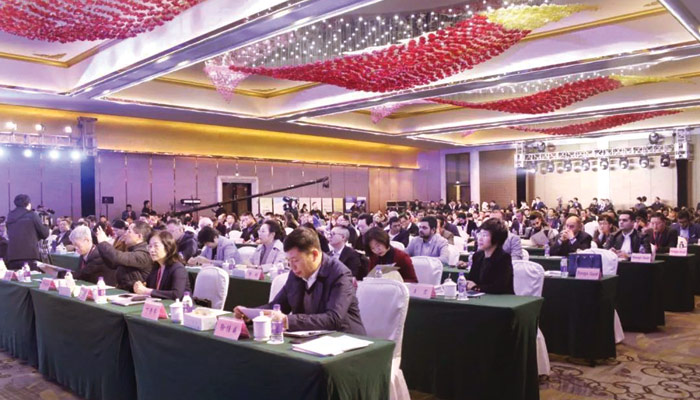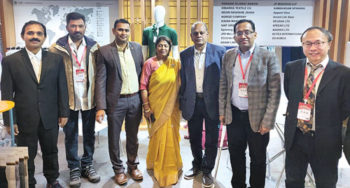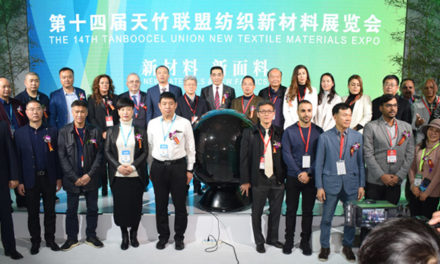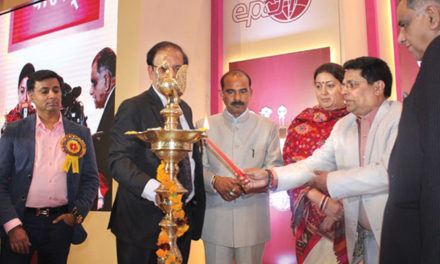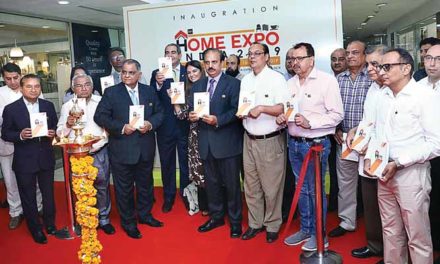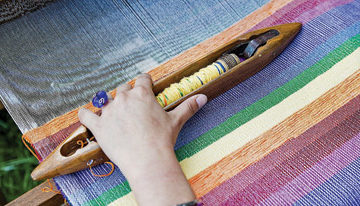The 15th Bamboo Union Representative Conference 2019 was organised on December 4-6, 2019 at Oriental Grand Hotel, Shaoxing, China. The International TANBOOCEL Alliance Annual Conference, Exhibition & Fashion Show aimed to build a platform for the upstream and downstream enterprises of the industrial chain to display and promote new products, to closely exchange and co-operate, to strengthen collaborative innovation, realize the co-construction platform, share resources, and develop together. Basically, to demonstrate to the whole world the outstanding achievement and innovation ability of the member of China TANBOOCEL Union.
A large number of companies joined the 15th Bamboo Union Representative Conference 2019. These included the top of textile companies from China, and US, Europe, Turkey, Iran, Japan, India, Korea, Pakistan, Indonesia etc. It was a conference cum exhibition where various Chinese and some international companies displayed their yarn and garments made from bamboo fibre. Besides, on day-one fashion show presenting trends collections 2020-21 made of bamboo fibre in both woven and knitted fabrics including kidswear, ladieswear, and menswear were also conducted. On the second day, after the conference TANBOOCEL Union Awards were also organised to facilitate companies from various parts of the world for their outstanding performance in promotion and sales of TANBOOCEL fibre. During the conference, Market Potential & New Products Development of Bamboo Industries was discussed by various speakers. The conference was attended by select Indian companies, namely RSWM, Sambandam Spinning, JPP Mills and JP Modatex and a delegation of viscose filament yarn users from Surat.
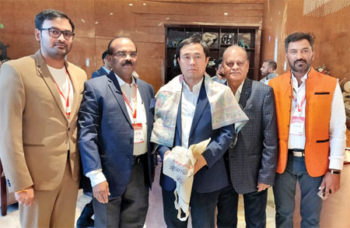
Song Dewu (C), Chairman and General Manager, Jilin Chemical Fiber Group Co., Ltd., and Kishan Kashiwala (2nd from R) of Spinning King (India) Ltd. with Indian delegates
While speaking during the event, Song DeWu, President of CTBU, said that the aim, objective and goal of organising the conference over the years is to share success stories and build platform for mutual benefits among the bamboo textile value chain. He said that innovation is the key to success and all the bamboo fibre stakeholders should strive for continuous product and process innovation to scale new heights. Besides, Xia Ling Min, Vice President, China National Textile and Apparel Council (CNTAC) observed that the journey of bamboo fibre has been a fruitful one. From being an ordinary fibre, it has now become a premium fibre thanks to its sustainable and biodegradable properties.
The Vice President of CNTAC called upon the conference delegates to imbibe the 4th revolution by taking advantage of digital age to promote bamboo textile and clothing. Internet sales is growing and apparel sales is also recording a growth online. Therefore, it has become imperative to harness online sales or else the industry will be left behind, he added. Yue FuSheng, Vice President of CTBU, in his ‘review of bamboo union’ suggested building a platform to promote fashion influence of bamboo and develop a fashion design team of bamboo.

Yue Fusheng, Vice President of Tianzhu Union and Deputy General Manager of Jilin Chemical Fiber Group
These days export & corporate market is looking for sustainable, eco-friendly; green products hence demand for the TANBOOCEL – HEBEI JIGAO Bamboo Fibre has increased. There are many new value added fibres, yarns are used in fabrics now. Apart from regular products i.e. Cotton, polyester & viscose (With blends), the value addition in all stages have taken place. In all new fabrics; bamboo with different blends are more in demand. Bamboo is naturally antibacterial, very smooth, odourless (due to anti-bacterial property) breathable fibre with a very high shelf life, so as fabrics too. Geo textiles, technical textiles, medical textiles are also fast growing segments. There are many applications of Plasma technology, supercritical carbon dioxide, ultrasonic waves, electrochemical dyeing, microwave dyeing, organic & natural dyes of textiles are some of the revolutionary ways to advance the textile wet processing.
From India, Kishan Kashiwala (Chairman) and Vaishali Kashiwala (New Product Development Division) of Spinning King (India) Ltd. for the TANBOOCEL bamboo fibre division and Ishan Umaria from AR Corporation of the filament division attended the event. Kishan Kashiwala made a presentation at the conference to discuss about the growing market of bamboo fibre in India apparel and textiles industry. Besides, AR Corporation took delegation from Surat along with it to China, who also displayed their filament fabrics in the conference trend area. In his presentation, Ishan Umaria of AR Corporation spoke about application and development of sustainable viscose filament yarn in India, informed that bamboo viscose yarn sales in India has grown from 900 tonne in 2017 to 5,000 tonne in 2019. By 2020, the sales are expected to increase to 8000, he added.

Xia Lingmin, Vice President of China Textile Industry Federation
Sandeep Rohilla, Deputy General Manager, New Product Development, RSWM Ltd. in his presentation said that textiles and clothing sector were contributing immensely to India’s robust growth and development. According to Rohilla, “We manufacture yarn with 100 per cent bamboo and blends for catering to all segments of textiles like home furnishing, suiting, shirting, knitting, inner wears etc. In today’s market scenario, all customers and brands are looking for ‘sustainable products’ and RSWM was working continuously on sustainability and has introduce new yarn range ‘Aroma’ in which bamboo fibre has been dyed with herbal dyes (fully natural dyes) to make the products truly sustainable.” Apart from this, agents from different countries also made presentations about their journey with TANBOOCEL in their respective countries.
It is noteworthy that Bamboo fibre was invented and manufactured by HEBEI JIGAO Chemical Fiber Co., Ltd, with a registered TM of TANBOOCEL since 2002. Certified for its excellent spinning and garment properties, the bamboo fibre product is currently in use by many medium and large-sized textiles and garment enterprises in both domestic and overseas markets. Relying on its expertise in bamboo fibres industry, HEBEI JIGAO continues to grow rapidly with focus on customer needs and product quality through technology, innovation and supply chain development. The company has invested in home textile factory and renovated its yarn mills to produce high quality bamboo fibre products. HEBEI JIGAO Chemical Fiber Co., Ltd is a leading producer and provider of 100% bamboo fibres since 2001. With more than 2,300 employees, HEBEI JIGAO provides a wide range of fibre products that include: Bamboo Fibres, Viscose fibres, Cotton pulp, Bamboo pulp, Wood pulp, Shenma fibre, Siwear intelligent temperature regulation fibre. Shenma & Siwear are patent products as well as Bamboo fibre.

Song Dewu, Chairman and General Manager, Jilin Chemical Fiber Group Co., Ltd., and President Bamboo Union
Out of total TANBOOCEL production, sixty per cent of bamboo fibre is consumed by China domestic market and rest 40 per cent is exported. In overseas, Turkey and India are the biggest markets having 50 per cent share each in our fibre exported. Otherwise, India and China are almost parallel when it comes to bamboo fibre’s consumption globally. Percentage wise, may be China has little more share but India is the second largest consumer of bamboo fibre. TANBOOCEL Bamboo fibres blends with cotton/ organic cotton/ linen/ polyester/ SILK and are used in terry towel, socks, knitting, weaving, SAREES & home furnishing products in bulk. Initially bamboo was used in knitting, now it has started being used in all mentioned products. The maximum consumption this year was by the knitting industry, especially in innerwear segment. This was followed by home textiles segment which is the other main area consuming in bulk. The maximum end products by spinners are exported overseas when compared to domestic market.
Indian domestic market is gradually increasing usage of bamboo products and day-by-day its consumption is increasing. Definitely the demand will increase in India in near future as there is huge scope. Every year bamboo fibre’s consumption is growing at 10-15 per cent. Compared to conventional cotton which is a regular product, it is more in demand as value added products. It has anti-bacterial properties so its demand is increasing among buyers of baby and health products. According to Kishan Kashiwala of Spinning King India – Associate of Jigao Chemical Fiber Co. in India, Spinning King & Tanboocel® Bamboo Fibre association has 100 per cent share in the Indian market. Year wise our sales figures were 680 tonne in 2016, 775 tonne in 2017, 900 tonne in 2018 and 1000-1200 tonne in 2019. India imported Tanboocel® – HEBEI JIGAO Bamboo fibre worth $3,601,028 with total quantity of 1,846,767. We have achieved these figures because of the high quality parameter of Tanboocel. We proudly can share that during this long business tenure; neither rejection nor any inferior quality complaint received from any of our business clientele.”
Speaking about bamboo fibres growth in India he said, “Looking at the growing needs of sustainable products worldwide, bamboo fibre will touch new heights in sales in coming years. In coming years we expect to see huge demand for Tanboocel® bamboo fibres in local Indian market. Now most of the leading brands in India are using the same. Some of the major mills and brands using bamboo fibre in India are IKEA, M&S, ALO & BELA – USA, H&M and PARK AVENUE (Raymond, India), HEELIUM (India).” Besides, Spinning King India Ltd has also launched bamboo socks recently. Tanboocel – Bamboo fibre’s property is the best among other fibres available in the market. It is “softer than cotton” and grows very fast when compared to other fibres, which take many years to grow. This fibre is one of the best for all kind of fabrics and garments. In India it is used majorly for knitting and weaving. In Pakistan our bamboo fabric is used for making denim fabrics. In China this yarn is processed to make bed sheets, which are exported to Europe and Canada. Bamboo fibre can be used in any textiles. Out of all segments bamboo is mostly used in knitting for making innerwear, sportswear and yoga wear. A total of 35 per cent of bamboo fibre is used for jersey fabrics.


